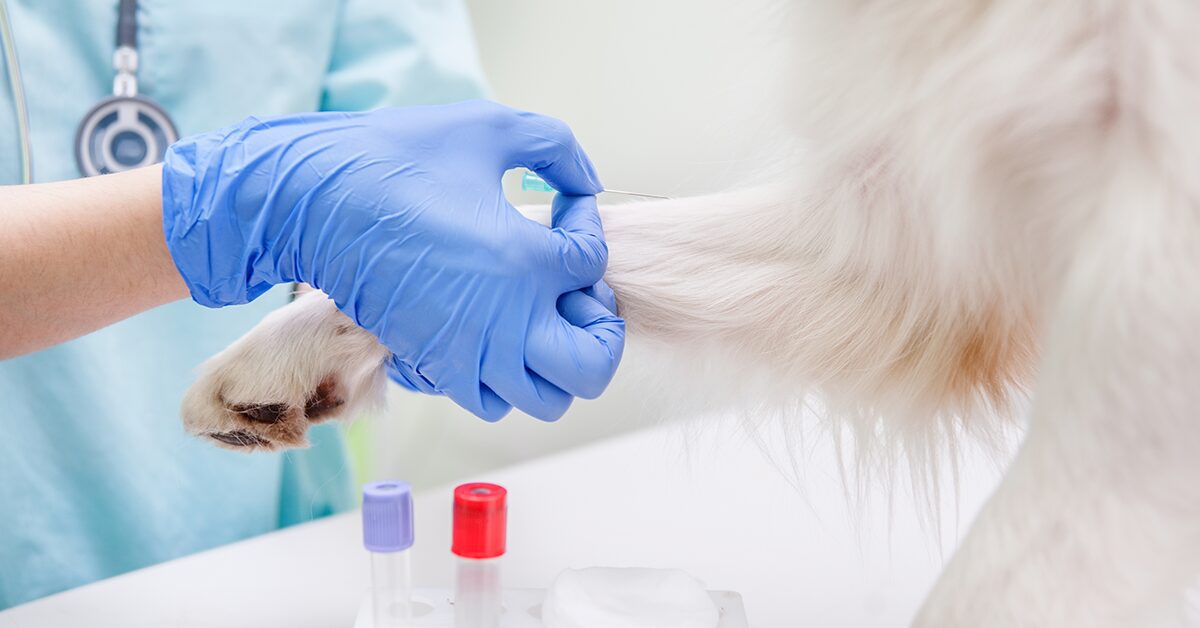Key Points
- Whether they’re skin allergies, food allergies, or environmental allergies, there are several kinds of allergens dogs can struggle with.
- Dog allergy tests can be an effective way to identify the allergen and bring your dog relief by reducing their interactions with it.
- There are three types of allergy testing methods: blood testing, intradermal skin testing, and an elimination diet (if a food allergy is suspected).
You just fed your dog some new and delicious treats, which they seemed to enjoy thoroughly. Suddenly, they feel itchy and start to develop hives. Ruh-roh! What’s going on here?
Like people, dogs can also struggle with allergies – and not just from a new bag of treats. Whether they scratch compulsively, sneeze frequently, or even begin to have digestive problems, our furry pals can exhibit a wide variety of unpleasant symptoms. That’s why it’s important for pet owners to learn about different allergens and how to spot them so that their pooch doesn’t suffer in silence. A dog allergy test may be a helpful way to detect allergies and prevent reactions from happening.
Dog allergies occur when your dog’s immune system overreacts to a specific allergen. There are several kinds of dog allergies for pet owners to be mindful of, especially as each type of allergy can provoke a different reaction. These include:
- Skin allergies
- Food allergies
- Environmental allergies
Here, we’ll go over common dog allergies and their symptoms, causes, and how you can help reduce your pup’s discomfort. Let’s dive in!
Skin allergies
One of the most common skin problems in dogs is allergic dermatitis, aka skin allergies. Dogs suffer from skin allergies for various reasons, including insect bites, food reactions, and other environmental factors.
While dogs can react negatively to spider, ant, bee, and fly bites, flea bites are typically the most likely to cause an allergic reaction. Flea allergy dermatitis (FAD) is an allergic reaction when a dog reacts negatively to a flea bite and suffers from excessive itchiness and skin irritation near their tail. Food and environmental allergens, like plants or pesticides, can also cause dogs to scratch and bite their skin – usually around their ears and paw pads – causing further inflammation and even hair loss. They may itch in other places as well, such as the ankles, groin, and face.
If left untreated, skin allergies can easily lead to a more serious bacterial infection. Like any ailment – the sooner you treat the reaction, the better!
Food allergies
Food allergies in dogs are gut-induced, usually caused by certain ingredients or chemicals in the dog’s food. Food allergens can be anything from simple proteins and carbohydrates to chemicals and preservatives used in dog food. Symptoms include itchy skin and paws, ear infections, vomiting, diarrhea, hair loss, red eyes, and rashes.
Environmental allergies
Environmental allergies in dogs include atopy, which is a genetic inhalant allergy that often occurs seasonally. Dogs with environmental allergies react strongly to various pollens and dust mites, similarly to people. However, their symptoms differ slightly, as they tend to itch their bodies or rub their faces. They may also develop atopic dermatitis, which is an itchy skin disease found in both dogs and cats.
Causes
Dog allergies are caused by various factors such as your dog’s breed, medical background, and living environment.
Skin allergies are usually caused by the following:
- Flea, spider, fly, bee, and ant bites
- Direct skin contact with any allergen
- Food sensitivities
- Dust, pollen, and mold
Food allergies are often caused by:
- Proteins and carbohydrates found in beef, chicken, egg, milk, wheat, soy, and corn
- Common ingredients, preservatives, and other chemicals in commercial dog food
Environmental allergies are typically caused by:
- Tree, grass, and weed pollen
- Mold, mildew, and dust mites
- Chemicals found in household products
Dog allergy testing methods
There are three ways to test for dog allergies:
- Blood testing: A vet takes a blood sample from your pooch and sends it to a lab, which then tests for reactions against various allergens like pollen, dust, and mold. Blood testing can also help detect allergic reactions to materials and fabrics. This is considered a less invasive form of allergy testing.
- Intradermal skin testing: Intradermal skin testing is slightly more invasive, as it requires the vet to sedate your dog before the actual dog allergy test. They inject a small amount of allergens directly into your pet’s skin, creating a pattern that makes it easier to detect a reaction. They then closely monitor your dog’s skin, looking for symptoms – like swelling – that indicate certain allergens are the cause for a response.
- Elimination diet: If your vet wants to rule out a food allergy, the only way they can do so is to put your dog on an elimination diet. This requires your dog to only eat a specific type of food for a set amount of weeks. If allergy symptoms resolve themselves during that time frame, this indicates that a food allergy is highly likely.
Treatment
The following are some common treatments that can help reduce your dog’s painful allergy symptoms:
- Shampoo therapy: Shampoo therapy washes away the allergens that may be stuck on your dog’s fur and skin. It can also help treat bacterial infections caused by rashes or excessive itching.
- Hyposensitization therapy: Also known as desensitization therapy, hyposensitization therapy involves regular allergy shots that gradually expose your dog to a small number of allergens. With repeated exposure, your dog then develops antibodies against the substances that cause allergic reactions.
- Anti-inflammatory therapy: This treatment involves anti-inflammatory drugs like antihistamines or corticosteroids, which help block allergic reactions before they occur. Alternative options are oral medications like oclacitinib.
- Food and diet: Your vet may prescribe protein-rich dog food and other fatty supplements, such as Omega-3 and Omega-6, which provide anti-inflammatory relief. If your dog suffers from a food allergy, a tailored diet can be most helpful in alleviating any unwanted reactions.
- Antibiotic medication: Itchy skin can lead to various skin infections if not promptly treated. Vets may prescribe antibiotic medication like apoquel to reduce itchiness for your dog.
Recovery and care
Following any of the treatments listed above can help your dog get back on their feet, especially if they’ve struggled with symptoms for an extended period of time. If you notice that your dog’s allergic reaction does not improve with attempted treatment methods, immediately get in touch with your vet.
Prevention
Dog allergy testing is an effective way to identify what your dog is allergic to, helping you reduce their interactions with certain allergens sooner. Whether you choose to do a blood test, skin test, or food elimination diet, each allergy test is designed to help you get to the bottom of your dog’s allergic reactions – and plan accordingly.
Lessening allergen exposure can look different depending on your furry friend’s needs. Make sure to stick to a hypoallergenic diet if your dog’s symptoms seem to be food-related. Vacuum and clean your house frequently to minimize dust, dander, and any pollen that may get inside. Immediately apply flea medication or other topical ointments for skin allergies. The faster you act, the less likely your dog will suffer from more serious health conditions!
What to expect at the vet’s office
When you notice that your dog is exhibiting symptoms of an allergic reaction, it’s best that you take note of each one to help your vet rule out other possible causes during your vet visit. Another underlying condition could be the culprit for your dog’s symptoms.
Before performing a dog allergy test, your vet usually conducts an extensive screening to determine the health issue and thoroughly reviews their medical history. After proper testing and diagnosis, they may also tailor a plan that’ll help you address allergic reactions and build your dog’s immunity through treatments like immunotherapy.
The bottom line
Dog allergies may not always seem dangerous, and fortunately, many symptoms are treatable. However, they can still cause major discomfort and lead to potentially serious health problems if no action is taken. As a responsible pet parent, it’s important to provide your beloved furry companion with the care and attention they need to thrive. Dog allergy testing is one of many ways to get started – but it doesn’t end there!
FAQs
Are dog allergy tests worth it?
Absolutely! It may feel like an extra step when taking care of your pup, but a dog allergy test is an effective way to identify underlying causes or even prevent future reactions to certain allergens. It’s a highly beneficial measure that pet owners can take to help their dogs live happy, healthy lives.
What are the benefits of testing my dog for allergies?
Dog allergy testing can be a preventive measure that improves your dog’s well being. By knowing which allergens your dog is reactive to, you can reduce exposure and develop treatment plans with your vet.
Can I test my dog for allergies at home?
Yes – there are several home allergy test kits that you can try. However, their results aren’t always accurate and can easily be affected by outside factors. If you want to create a treatment plan that truly meets your dog’s needs, it’s probably better to visit your vet and let them do the dog allergy test instead.
Did you know?
- Allergies are fairly common in dogs, with many pups being affected as early as six months old. Symptoms generally appear when they’re between one to three years old.
- Dogs usually do not suffer from a single allergy, but may have multiple, depending on their genetics, health background, and living environment.
- Working together with a vet can help you develop a strong, effective treatment plan for your beloved pup.




